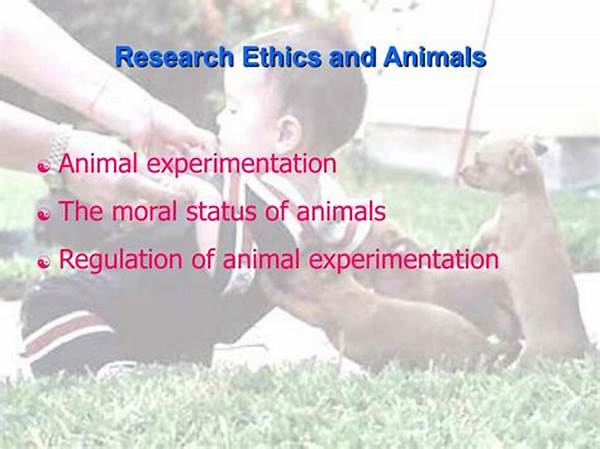“`markdown
Read Now : Personalizing Media For Cultural Diversity
Hey there! If you’re like me, you probably love animals and are keenly interested in how they behave. But have you ever stopped to wonder about all the behind-the-scenes work that goes into studying these fascinating creatures? If so, today’s your lucky day! We’re diving into ethical animal behavior research practices—a topic that’s as important as it is interesting.
Understanding Ethical Animal Behavior Research Practices
First off, let’s set the stage. Ethical animal behavior research practices are all about studying animals in a way that respects their well-being and dignity. Scientists use specific guidelines to ensure their research does not cause unnecessary harm or distress. This involves everything from choosing the right environments for animals to smartly designing experiments so they yield useful data without compromising creature comfort. So, whether it’s observing meerkat social structures or investigating bird migration patterns, ethical practices ensure that the subjects’ rights are always top priority.
It’s easy to overlook how much care and consideration goes into ethical animal behavior research practices unless you’re directly involved in the field. The truth is, these practices play a pivotal role in making sure that research is conducted responsibly and empathetically. Researchers often go through extensive training to master the intricacies of these guidelines. It’s enlightening to see how a balance between scientific exploration and ethical responsibility can yield results that are both fascinating and conscientious.
More than just about following rules, ethical animal behavior research practices are also about fostering a culture of respect and integrity. These standards serve as a touchstone, reminding researchers why they do what they do. The idea is to advance our understanding of the animal kingdom while ensuring a harmonious coexistence with the creatures we share this planet with. So next time you read about a new discovery in animal behavior, remember there’s a team of dedicated researchers who’ve worked their tails off to make it happen, all while minding the ethics of their craft.
Key Elements of Ethical Animal Behavior Research Practices
1. Animal Welfare First – Ethical animal behavior research practices prioritize the welfare of animals above all, ensuring they are not subjected to unnecessary harm.
2. Informed Consent (for Humans) – Just like in human studies, any people involved in animal research must give informed consent, adding a layer of ethics to what happens behind the scenes.
3. Minimal Disturbance – Ethical guidelines dictate that researchers should strive to disturb animals as little as possible while conducting their studies.
4. Appropriate Environment – Ensuring animals are studied in environments that are as close to their natural habitats as possible is a key ethical concern.
5. Transparency – Being open about methods and intentions is central to ethical animal behavior research practices, allowing for improved trust and accountability.
The Importance of Honesty in Ethical Practices
Honesty is a cornerstone of ethical animal behavior research practices. Scientists are expected to report their findings truthfully and responsibly, without manipulating data for desired outcomes. This commitment not only boosts the credibility of the research but also fosters a culture of trust in the scientific community. After all, whittling down the complex behaviors of animals into something we can understand is challenging enough; honesty ensures the journey from data collection to real-world application is as transparent as possible.
Read Now : No-cost Watermarking Solutions Online
Trust is not something earned lightly, especially when it comes to animal research. For many, the thought of compromising an animal’s natural way of life in the name of science can be unsettling. However, ethical animal behavior research practices alleviate these concerns by adhering to rigorous standards that hold scientists accountable. Through this transparent and honest approach, research maintains its integrity and value, both within academic circles and in the broader public arena. So, the next time you come across a study shedding light on an interesting aspect of animal behavior, you can feel confident that the researchers conducted their work with integrity and respect.
Why Ethical Practices Matter in Animal Research
Understanding ethical animal behavior research practices is like peeling back the curtain on a stage production—ensuring everything runs smoothly and ethically requires a lot more effort than what meets the eye. A big part of this involves adhering to strict guidelines and being honest about the stuff that goes into the research. This not only protects the animals but also significantly influences the credibility and effectiveness of the studies. Everyone involved, from researchers to the general public, benefits from maintaining high ethical standards.
Beyond just standing at the intersection of science and morality, ethical animal behavior research practices also have far-reaching implications on society as a whole. By studying animals in a manner that respects their well-being, we gain insights not only into their world but into our own as well. We learn about the complexities of ecosystems, social structures, and even our own impact on the natural world. All of this information can aid in crafting policies and initiatives that work toward conservation and the betterment of both animal and human lives. So while ethical practices serve the immediate purpose of guiding responsible research, they also lay the groundwork for a more informed, conscientious society.
Ethical Frameworks for Conduct
Setting up an ethical framework for conducting animal behavior research might seem like a tall order, but when you break it down, it’s all about taking key fundamental concepts and applying them strictly and consistently. While the ethical frameworks provide the roadmap, it’s the researchers’ responsibility to stick to the path and adapt as needed without compromising on ethics.
Furthermore, ethical animal behavior research practices have to contend with evolving societal expectations and technological advancements as they draft an ever-changing blueprint. Each study serves as both a building block and a learning opportunity, so researchers are never stagnant; they’re always learning and improving. This dynamic interaction brings an exciting challenge yet necessitates adherence to rigorous ethical standards and a sense of adaptability, enabling science to progress without losing sight of its core mission—respect and responsibility toward animals.
Wrapping Up the Importance of Ethics in Animal Research
Compassion and curiosity don’t often go hand in hand, but they do in ethical animal behavior research practices. You can have an unquenchable thirst for knowledge while still valuing the lives and dignity of the creatures you’re studying. Isn’t that the best way to learn? By observing and appreciating these fantastic creatures in a way that’s respectful and insightful, we gain so much more than just data—we cultivate a spirit of understanding and appreciation.
At the end of the day, ethical animal behavior research practices aren’t just for the animals; they’re for us too. They remind us of our responsibility as stewards of the planet and the importance of making choices that honor the life forms we share it with. From the seasoned researcher to the layperson fascinated by animal antics, ethical research practices forge a connection that’s built on respect, curiosity, and a shared mission to understand the world better. That’s pretty cool, right?
“`



